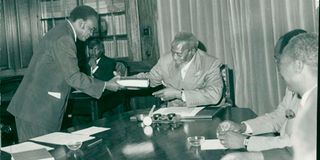Ndegwa Commission never gave free rein to public servants’ feeding frenzy

The chairman of the Commission of Inquiry into tbe Public Service Structure and Remuneration, Mr. Duncan Ndegwa, presents the report to President Mzee Jomo Kenyatta at State House, Nairobi, on May 4, 1971.
What you need to know:
- The genesis of old Ndegwa’s notoriety is May, 1971, when he presented to President Jomo Kenyatta the report of a commission of inquiry he had chaired.
- In this odious manner, Ndegwa is often criticised for striking a devastating and incurable blow to ethics and integrity in government.
To hear the Kenyan elite’s zealous but no less disingenuous lamentation of our ruinously endemic moral turpitude, one must be forgiven for imagining that one Mzee Duncan Ndegwa espouses a diabolical strain of impunity.
It is an obligatory refrain in our superficial anti-corruption liturgy to blame Ndegwa for opening the floodgates of conflict of interests, thereby inaugurating a spectacular orgy of corruption which, over decades, has brought Kenya to the brink of ruin: a hollowed state, and millions deprived of dignity and opportunity.
The genesis of old Ndegwa’s notoriety is May, 1971, when he presented to the first President Jomo Kenyatta the report of a commission of inquiry he had chaired.
It is accepted as a verity of unassailable dimensions that the Ndegwa Commission report, as it came to be known, recommended that civil servants be permitted to do business with government regardless of whether that creates a conflict of interests, undermines the credibility of the public service or erodes public confidence in the government.
In this odious manner, Ndegwa is often criticised for striking a devastating and incurable blow to ethics and integrity in government.
This Ndegwa hypothesis has proven compelling principally because of the confidence with which it is asserted by ostensibly knowledgeable people.
Moreover, a simple and tidy explanation is needed for the resoluteness with which the entire public sector coalesced into tumultuous feeding frenzy of rapacious civil servants and insatiable politicians.
Kenya’s wealthiest dynasties and Croesus-like oligarchs are not industrialists, merchants, inventors or artists; they are politicians, civil servants or their business associates.
Private interests
What passes for ‘old money’ around here dates back to the 1960s, and the many celebrated estates are directly affiliated with documented instances of financial banditry.
Like predators gorging on a kill, top civil servants’ property holdings burgeon immensely by the day, and around them teem swarms of scavengers masquerading as suppliers, contractors, consultants and wheeler-dealers, each awaiting their turn to bite a chunk and kick morsels back to the ecosystem.
Our economy bleeds Sh2 billion every day to this relentless monster.
Explaining its genesis, longevity and resilience requires a theory of abetment bordering on explicit permission, and that is what the Ndegwa Hypothesis does.
But what are the facts?
At the beginning of 1970, Mzee Kenyatta appointed the Ndegwa commission “to examine and investigate into matters affecting the structure and remuneration of the public service….”
Its report is detailed, running to 397 pages. Of interest, however, is the portion on ‘Private Interests’ at page 13, and in particular, paragraph 31: “With the above considerations in mind, we suggest there are certain general principles which should be observed in the conduct of government business of all types and with which ministers, members of Parliament and all public servants would wish to associate themselves.
“We consider that all those who serve the Republic should give it their undivided loyalty wherever and whenever it has a claim on their services; should not subordinate their duties to their private interests nor put themselves in a position where there is conflict between their duty to the state and their private interests; should not outside their official duties be associated with any financial or other activities in circumstances where there could be suspicion that their official position or official information available to them was being turned to their private gain or that of their associates; should not engage in any occupation or business that might prejudice their status as members of the public service or bring any such service into disrepute; and finally should at all times maintain the professional and ethical standards which the nation expects of them in transacting government business with efficiency, integrity and impartiality.”
Influence and authority
And in chapter XXII, the Ndegwa report recommends the urgent appointment of an ombudsman as a means of preventing abuse by civil servants of their powers to the detriment of private citizens.
In his autobiography, Walking in Kenyatta Struggles, Ndegwa says that this proposal was shot down by the attorney-general, most probably because he thought it would cut down his own powers, influence and authority.
Certainly, the reasons set out in the Sessional Paper opposing it appear spurious and ill-conceived.
Charles Njonjo, the attorney-general, became a controversial, ambitious and Machiavellian billionaire.
The notion that the Ndegwa Commission permitted a nefarious free-for-all is mystifying. In any event, the recommendation of a commission report would have required legislative amendments of the Prevention of Corruption Act, Cap 65, which remained untouched from its passage in 1956 until 1991, when Kenya Anti-Corruption Authority was established.
In other words, citing utterly non-existent or grossly distorted permission to steal demonstrates the desperate depravity of our elite: regardless of what the law says, they were determined to steal anyway.
Ndegwa is a miserable pretext to rob fellow Kenyans.
The writer is an advocate of the High Court and a former State House speech writer. @EricNgeno




